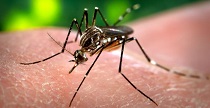What is Zika virus?
Zika is a mosquito-borne virus that is currently causing a large outbreak primarily in Central and South America. In addition, the Florida Department of Health has identified an area in one neighborhood of Miami where Zika is being spread by mosquitoes. The Centers for Disease Control and Prevention (CDC) has issued guidance for people who live in or have traveled to this area any time after June 15.
What are the symptoms of Zika virus?
Only about 1 in 5 people with Zika virus will get symptoms of illness; because of this, many people may not realize they have been infected. If a person does develop symptoms, they’re usually mild and include fever, rash, joint pain, or conjunctivitis.
How does it spread?
Zika virus is spread through the bite of an infected Aedes species mosquito. Zika virus can also be sexually transmitted.
Who is most at risk for complications from Zika virus?
Pregnant women are most at risk for complications from Zika virus. This is because Zika can be passed from a pregnant woman to her fetus; infection during pregnancy can cause microcephaly in babies. Microcephaly is a birth defect where a baby’s head is smaller than expected. This birth defect can result in seizures, intellectual disabilities, and developmental delays, among other problems.
Currently no vaccine or medication exists to prevent or treat Zika virus infection. CDC now recommends that all pregnant women in the United States be assessed for possible Zika virus exposure during each prenatal care visit.
CDC has issued updated guidance (7/29/16) describing what couples can do to reduce the risk of Zika virus transmission. Visit the CDC website for the most up-to-date information on how to prevent Zika transmission to pregnant women or women who wish to become pregnant.
How can pregnant women prevent Zika virus?
Out of an abundance of caution, the CDC recommends special precautions for pregnant women and women trying to become pregnant:
- Pregnant women in any trimester should not travel to the areas where Zika virus transmission is ongoing. Pregnant women who do travel to one of these areas should talk to their healthcare provider first and strictly follow steps to avoid mosquito bites during their trip.
- Women trying to become pregnant should consult with their healthcare provider before traveling to these areas and strictly follow steps to prevent mosquito bites during their trip.
- Pregnant women should discuss their male partner’s potential exposures to mosquitoes and history of Zika-like illness with their healthcare provider.
What are some tips to avoid mosquito (bug) bites?
Mosquitoes that spread Zika virus bite both indoors and outdoors, mostly during the daytime; therefore, it is important to ensure protection from mosquitoes throughout the entire day.
- Use an Environmental Protection Agency (EPA)-registered insect repellent.
- Follow product directions and reapply as directed.
- If using sunscreen, apply sunscreen first and insect repellent second.
- Using an insect repellent is safe for pregnant women and nursing mothers.
- Cover exposed skin by wearing long-sleeved shirts, long pants, and hats.
- Avoid woody and brushy areas with high grass, brush, leaves, and standing water.
- Regularly empty containers outside your home that trap standing water such as planters, bird baths, and toys.
- Contact your local health department to report high numbers of mosquitoes or standing water in your neighborhood.



.png?width=850&height=850&name=lane%20badge%20(1).png)


-1.png?width=711&height=711&name=healthy%20br%20(4)-1.png)

